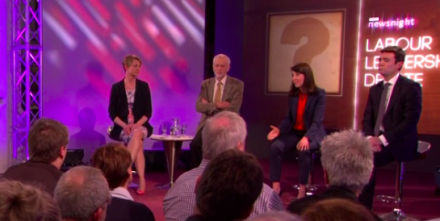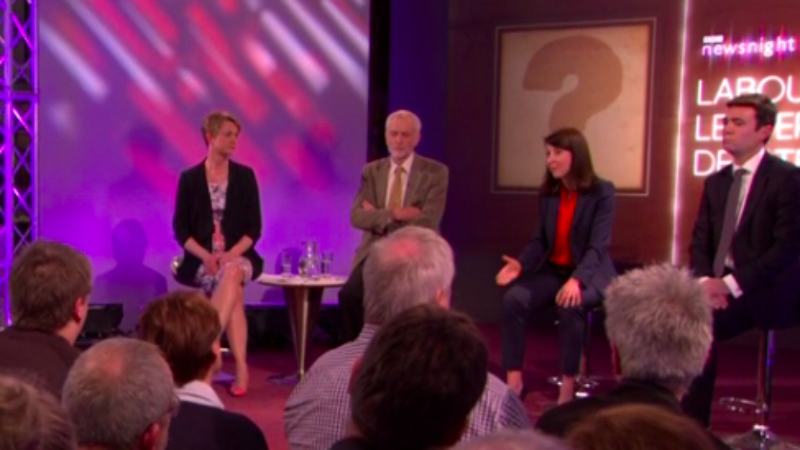
The next few weeks are, whatever the outcome, going to be crucial to Labour’s future. Either the party will elect the most left wing leader in its history and go on an experimental voyage to see if every presumption about the views of the British electorate can be overturned (when all the presumptions were vindicated as recently as this May), or Jeremy Corbyn will be narrowly defeated and this will be seen as a turning point where Labour started to come to its senses, much like Healey’s narrow defeat of Benn for Deputy Leader in 1981.
Corbyn can be beaten but we should not think this election will mark an end to the ideological strife that has engulfed the party. Whoever wins will try to reunify but the bitterness that has been expressed can’t be easily unsaid. If Corbyn his leadership will inevitably be dominated by conflict with a PLP who will resent being “led” by someone who has perpetually broken the whip; who will want to draw a line in the sand somewhere when their principles and beliefs on many policy issues will be under attack; and who will be torn between fear of deselection by a resurgent left and losing their seats anyway if they go into the 2020 General Election with a manifesto even less resonant with swing voters than the 2015 one was. If he loses some of his supporters will melt away as they were looking for a quick fix, but the Hard Left in general will have been strengthened by the new recruits of the last few months and the sense it is no longer inevitably a minority faction, and will be looking to reassert itself at Conference, in internal elections for the NEC and CAC, in selections and in CLPs and councils. A non-Corbyn leader will find themselves more engaged with the internal politics of the party and fire-fighting an insurrectionary internal opposition than any leader since Kinnock. All this at a time when we desperately need to look outwards and reconnect with what Middle England (and Middle Scotland and Wales) are actually thinking.
The inheritance of the new leader is immeasurably worse than the already catastrophic electoral situation bequeathed
on 7 May. We can add to the public’s opinion of Labour as well meaning but out-of-touch and probably economically incompetent dreamers several months intense media evidence that we are hopelessly divided, more interested in fighting each other than the Tories, and contain within our ranks very large numbers of people whose thinking owes more to the St Petersburg Soviet in 1917 than it does to voters in Nuneaton in 2015.
The people who bemoaned Ed Miliband’s efforts to keep the party united from 2010-2015 now know what disunity looks like and feels like.
At the start of May I thought we had the most united and friendly Labour Party I had seen in my 27 years as a member, and also the most impressive campaigning machine.
We have unmade all that double-quick and are now into the circular firing-squad mode that characterised every other period of opposition (1931, 1951, 1970, 1979) except with the added charm that our former ministers are dismissed as “Tories”, “social democrats” having lost its potency as an insult.
And we go in to this period with three of our historic “automatic stabilisers”, the forces that always restored Labour to sanity, gone. Scotland with is phalanx of moderate MPs is gone. The PLP has allowed itself to be written out of power in Labour’s internal deliberations. And the unions, which were always part of the solution because they were full of working class pragmatists, are now in the case of Unite and Unison and the CWU part of the problem because they have nominated Corbyn and their ridiculous hyped-up anti-Blair rhetoric has given the green light to anyone motivated more by bile than comradeliness to join in.
How did we get in this mess?
We all share some of the blame and all face difficult choices.
Ed Miliband and his team panicked over a parish pump dispute about the Falkirk selection and ended up running a full scale review of the Party’s internal democracy that went far beyond parliamentary selections and had unintended consequences. In order to appease angry Blairites who wanted primaries, the Registered Supporters scheme was beefed up from its “Refounding Labour” version where Registered Supporters had their leadership vote share triggered only if there were 50,000 of them and capped at 10% to one where they automatically get the same vote as long-standing party members. An Electoral College system that was inherently stable as it recognised the equal say over the leadership of three key stakeholders, the members, affiliates and MPs, was abolished. We now have the ludicrous and perverse situation where a newly signed up member or supporter has the same say in picking Labour’s leader as an MP who has served for 30 years.
In general Ed’s relationship with the major unions was like that of a particularly nervous Saxon abbot confronted by a shipload of Viking berserkers outside his monastery. He tried to pay them off with Danegeld in the form of a parliamentary selection here, a policy concession there. Danegeld doesn’t work, the Vikings just take it and come back next summer with more longboats and sharper axes.
The irony being that in turn the trade union leaders are like Saxons paying Danegeld to their own marauding Vikings, the far left forces in their unions which range way beyond the Labour Hard Left to include the Leninists of the Socialist Workers Party, TUSC (encompassing the Socialist Party, once Militant) and the Communist Party of Britain. Except in this case the Danegeld ends up being tossing them a Corbyn nomination for Labour Leader, in the hopes they won’t oust you as General Secretary.
Why did the PLP meekly accept the end of its 33% say in electing Labour leaders? If it had stood and fought and made common cause with the unions it could have held to the previous constitutional settlement.
The Blairite right have their share of culpability for this mess. They assumed that David Miliband’s vote share among ordinary members would roll forward into this contest, not realising the membership had changed and so had the candidates. They reacted to the election result with a semi-gleeful air of “I told you so” which alienated everyone to their left. They gave us the bizarre spectacle of anything up to half a dozen candidates with broadly the same politics scrambling for 35 nominations then withdrawing. They landed us with the Registered Supporters scheme. Their strategy has been bizarre – rather than try to build a coalition capable of reaching the 50% needed to win the leadership they have run as the purist of the pure, setting the ideological bar so high that many people who would call themselves Blairites don’t qualify. Their general sniffiness towards anyone to their left extended to many of them holding out against transferring to Cooper or Burnham until recent days, on the basis either that Cooper and Burnham are no better than Corbyn, or that the whole Corbyn surge was a ruse got up by their moderate rivals to scare them into transferring. Vast organisational investment has delivered just 18 CLP nominations for Kendall.
My own bit of the party, the traditional pre or non Blairite right, has contributed too. We couldn’t come up with a unified position around one candidate and the nomination stage looked like an unseemly game of people trying to guess who the front runner was and back them. Our organisational base has grown cobwebs and had to be renewed during the campaign. Some of us, including me, had grown complacent and soft in our assessment of the Hard Left, and advocated Corbyn being helped onto the ballot because we had come to see them as an eccentric minority to be tolerated rather than an existential threat to Labour’s electability.
The Hard Left themselves probably saw themselves the same way – a hard done by minority that needed to beg for acts of political charity in order to express themselves. They need to decide if they want to be the conscience of the party, and regarded with guilt and admiration by the mainstream for cleaving to an orthodoxy we are too sinful and pragmatic to sustain, or to aspire to run the show in which case they’ll find the game is a lot rougher. They are not ready to win and I don’t believe Corbyn wants to be leader. He isn’t who they would have run if they did expect to win (Jon Trickett must be kicking himself). If they do sneak a win they don’t have the support amongst MPs or at any other level in the party to sustain it, unlike in the 1980s where they had done a decade of careful building at every level. It would all end in tears. And they have picked up new support from people who don’t have their longterm analysis, their ideological certainty about socialism, and their loyalty to the Labour Party. At some point the former Green voting middle class or student liberals and idealists are really going to fall out with the disciplinarian machine politicians. They still have a way out – Corbyn could gracefully withdraw this week and say he has made his point but never intended to be leader.
That leaves us with the Soft Left. The bit of Labour’s left that is in policy terms sympathetic to Corbyn’s analysis but can often be persuaded to compromise both for the sake of party unity and because they can see that winning elections is how you change anything for the better. They don’t really have a candidate in this race. So some of them are backing Corbyn, knowing he would drag the party over the precipice, but believing 2020 is lost anyway, so Hell why not go down shouting. Others are realigning themselves and supporting Burnham or Cooper in the hopes of sustaining some kind of unified, pluralistic and electable Labour Party. The decisions made by people on the Soft Left will determine the outcome of this election and Labour’s fate, just as it did in the 1980s. Then they were aligned first of all with the Bennite Hard Left, with the Soft Left LCC a full participant in the RFMC (Rank and File Mobilising Committee) but then when the damage Benn was doing to Labour’s electability became apparent, they realigned, with Kinnock and other Soft Left MPs stopping Benn from beating Healey, and then himself becoming Leader in a “dream ticket” with the right’s Roy Hattersley as deputy. This decision eventually led to Labour slowly working its way back to power, with Soft Left Ministers like Robin Cook, John Prescott, Clare Short and Frank Dobson forming the forgotten third component of the “New Labour” coalition alongside the Blairites and Brownites.
Today’s Soft Left – or call them sensible left, or whatever, have the opportunity to play the same pivotal role. They can put Corbyn in and then have to help the rest of us deal with the consequences, or they can decide now to be part of a broad coalition for unity and common sense that stops Corbyn now and resets Labour on the path back to power and delivering for the people who need a Labour government.






More from LabourList
A year in power: The cabinet on their proudest wins and favourite moments
Southwark leader race ‘to be re-run over rule breach claims’ as left-winger wins
Welfare vote: ‘Three options Rachel Reeves has to plug the fiscal gap’